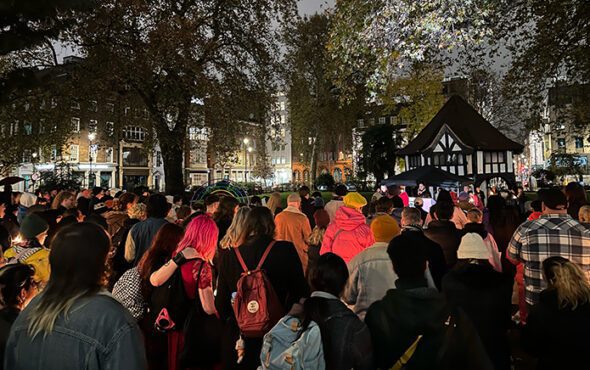
Hundreds attended a vigil held in London last night to remember and mourn members of the trans+ community lost over the past year.
Content warning: This story includes topics that could make some readers uncomfortable and/or upset.
Held in Soho Square on Transgender Day of Remembrance, which is marked annually on 20 November, it was one of three vigils taking place simultaneously across the country, the others being in Cardiff and Manchester.
Not a Phase, a trans-led, grassroots charity dedicated to awareness campaigning, social projects and funding new initiatives for the trans+ community, organised the vigils.
Danielle St James, its Chief Executive, told GAY TIMES that the team sees it “as an honour” to be able to “bring people together in a safe, welcoming environment.”
“I think that’s allyship in action to see everybody coming together, whether trans or not, to support the community,” she continued. “We spend 365 days a year trying to support and uplift trans adults and this just encompasses everything that we hope to achieve.”
Speakers at the event in London included Stephanie Fuller, CEO of Switchboard, Kate Litman, sister of Alice Litman, and Ren Mars, a trans activist.
With speeches from:
🕯️ @danistjames on behalf of Brianna Ghey’s mother Esther
🕯️ @switchboardLGBT CEO @StephFuller_
🕯️Trans activist Ren Mars
🕯️ @kate__litman from @alicescampaign pic.twitter.com/M41FtVQTSk— GAY TIMES (@gaytimes) November 20, 2023
Transgender Day of Remembrance has been an annual tradition since 1999
Transgender Day of Remembrance was started in 1999 by trans advocate Gwendolyn Ann Smith as a way of honouring Rita Hester, a trans woman who was killed a year earlier.
It has since continued to be an important tradition that allows people to pay their respects to members of the trans+ community that have tragically been lost.
According to a new report from Transgender Europe, more than 320 trans and gender-diverse people were killed globally between 1 October 2022 and 30 September 2023.
READ MORE: ‘It’s beautiful, unique and amazing’: 6 trans and non-binary icons on the power of their identities
Approximately 94 per cent of victims were trans women or trans feminine people, while more 48 per cent of those whose occupation is known were sex workers.
“These numbers are just a small glimpse into the reality on the ground,” the report said.
“Most cases worldwide continue to go unreported. Those that are reported receive very little attention.”



